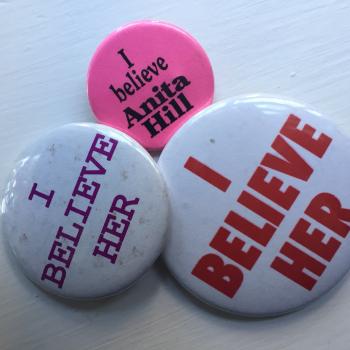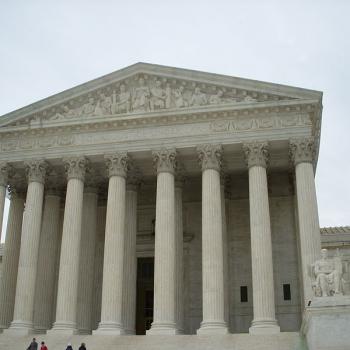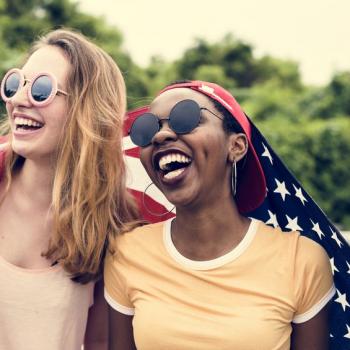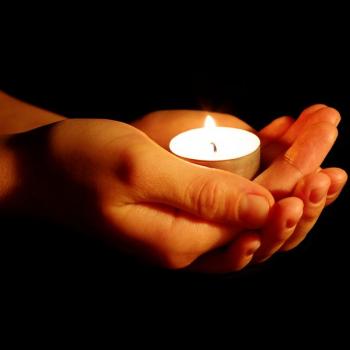On February 26, 2012, Trayvon Martin was shot to death by George Zimmerman. Just over a year later, Zimmerman was acquitted of murder, sparking deep-seated reactions in white and black communities across the country.
In the wake of the Zimmerman acquittal, black communities embraced the hashtag #BlackLivesMatter as an expression of their deepest feelings of betrayal, anguish, and frustration at the structural evil of racism that continues to regard the violent deaths of black people as acceptable. This acceptance of the violent deaths of blacks is the legacy of a culture that actively participated in the enslavement, murder, and lynching of black people for generations.
Slavery, lynching, forced breeding, Jim Crow, and rampant injustice and disregard for the basic human dignity of black lives is the very real history of our country.
In 1955, Emmett Till was lynched by two white men for flirting with a white woman. He was a 14-year old black boy visiting relatives in Mississippi from his home in Chicago. His mother insisted that there be an open casket at the funeral so that the world could see what had happened to her son. His death sparked national outrage, as did the acquittal of his two killers the month after his murder and has been cited as a major factor in moving the Civil Rights Movement forward.
In similar ways, the death of 17-year old Trayvon sparked a similar social movement. President Obama famously said, “If I had a son, he’d look like Trayvon.” This statement was monumentally important in our cultural context largely because the majority of white America did not “see” Trayvon as looking like their child.
What they saw was a young, black man. In a hoodie. In a gated neighborhood. Instead of their child, too many white Americans saw someone that they too might fear if they ran across him in their own neighborhood.
In her reflections on the origins of the Black Lives Matter movement, one of the founders commented:
So I started writing a love note to Black people on Facebook, saying that it wasn’t our fault. And it didn’t have anything to do with pulling up your pants, or voting, or education, or any of that. That fundamentally what it has to do with is systemic racism. And what I said was something to the degree of, “Black people I love you. I love us. Our lives matter. We matter. Black Lives Matter.
She titled the post “A Love Note to Black People.” With that, a new social movement was born.
One year later, Michael Brown’s death in Ferguson, MO captured the headlines across the country for many weeks as the citizens of Ferguson rallied to demand justice for Brown and changes in the policing structures and culture of racism that shape their everyday lives. People from around the country poured into Ferguson over the following weeks and months, uniting under the banner of “Black Lives Matter.” Many who couldn’t make the trip held “die-ins” at college campuses, legislative bodies, and protests across the country in solidarity with the citizens of Ferguson to emphasize the expendability of black bodies.
Less attention was given to another killing that very same week in Ohio. Just four days before Michael Brown’s death, John Crawford, III, a 22-year old black man and father of two was shopping in Walmart when he picked up a toy rifle for his son and continued walking around the store and talking to the mother of his children on his cell phone. A white male customer in the store saw Crawford with the toy rifle and called 911. White police officers arrived, approached Crawford and told him to put the gun down. They then shot and killed him. His last reported words were “It’s not real!”
The real problem is that there are so many Trayvon Martins, so many Michael Browns, so many John Crawfords. Cops killing black men is too common. Black males between the ages of 15-19 are 21x more likely to be shot and killed by police than white male teens. The Washington Post noted in a recent article that “Although black men make up only 6 percent of the U.S. population, they account for 40 percent of the unarmed men shot to death by police this year.”[1]
The phrase “Black Lives Matter” entered our lexicon in the midst of a world where black lives are treated as expendable, in the midst of a world where young black men are killed seemingly indiscriminately simply because they are black and their very normal actions are “read” as “scary” or “dangerous” or “threatening.” Actions that you or I, as white people, might make on a daily basis with no thought of the possibility that our actions might be perceived as scary, dangerous, or threatening.
Several weeks ago, I read about what happened to Marcia Bowden and her husband Ira Marche when they were stopped for speeding in Mississippi, just across the state line from their home in Memphis, TN. Bowden is a well-respected physician in her community and she and her husband were both arrested after a traffic stop for speeding “escalated” when neither Bowden nor Marche were able to find their driver’s licenses.
I, too, have been stopped for speeding, more than once. I have driven without my license, more than once. Both of these things are against the law. Yet, I have never feared that a traffic violation would “escalate,” that I would be arrested for traffic violations, or that I might be in any danger when being stopped by the police. But I am white, and Marcia and Ira are black.
That is white privilege. I didn’t ask for it. I didn’t do anything to receive it. But there it is.
There is actually now data that supports what many of us already know. The New York Times recently did an in-depth study of racial profiling in Greensboro, NC, the town where I live and where our law school is located. They found:
More than four times as many blacks as whites are arrested on the sole charge of resisting, obstructing or delaying an officer, exactly what happened to Marcia and Ira just outside Memphis.
They also found that in addition to extremely disproportionate rates of being stopped for no apparent reason between black and white drivers, black drivers and their cars are searched twice as often as white motorists, despite the fact that drugs and weapons are found significantly more often when the driver is white.
Now, many whites across this country have reacted in support of the Black Lives Matter Movement. However, too many whites have reacted with surprise or anger toward the Black Lives Matter movement. Some have even indignantly suggested that we ought to rally around the cry that “All Lives Matter.”
Well, of course all lives matter. But that’s beside the point. It distracts from the point. In fact, it misses the point entirely. “All lives” are not under threat. It is black lives that are being disrespected, constrained, poisoned, imprisoned, beaten, raped, and extinguished.
Slavery, lynching, forced breeding, Jim Crow, and rampant injustice and disregard for the basic human dignity of black lives this is our inheritance as a country, this is our original sin, this is our legacy of racism – a deep and abiding fear of black men in our culture and an equally deep and abiding condescension and scorn of black women.
This is why the call that “Black Lives Matter” is so deeply resonant and important in our society. It is important for black people to say and to hear and it is equally important for white people to say and to hear. Black Lives Matter. Full stop.
For non-blacks to join the Black Lives Matter movement is to express the deep Christian tradition of solidarity, of crossing lines of difference in brotherhood and sisterhood in the name of Christ. To join together in solidarity is to live into the prophets’ call for justice (Micah 6:8) and the gospel call to follow Jesus in breeching traditional barriers and reaching across lines of difference to recognize human dignity in the other. Jesus did this time and time again, with the Canaanite woman, with lepers, and prostitutes, with Zaccheus, with Samaritans (Canaanite woman, Mt. 21-28). All of these folks were disdained and reviled in Jesus’ time, yet he recognized their humanity and reached out to them in solidarity.
The call to social justice is deep in the Christian tradition and many Christians have shaped their lives in response to that call. The Black Lives Matter Movement is a call to action to challenge the deep structures of racism in our country that allow for the abuses and indignities afforded to blacks on a daily basis. It is time for Christians to stand up and respond.
I offered these remarks at an evening event focused on Engaging Race, Racism, Privilege, and the Bible this week as part of Elon’s winter term .
















